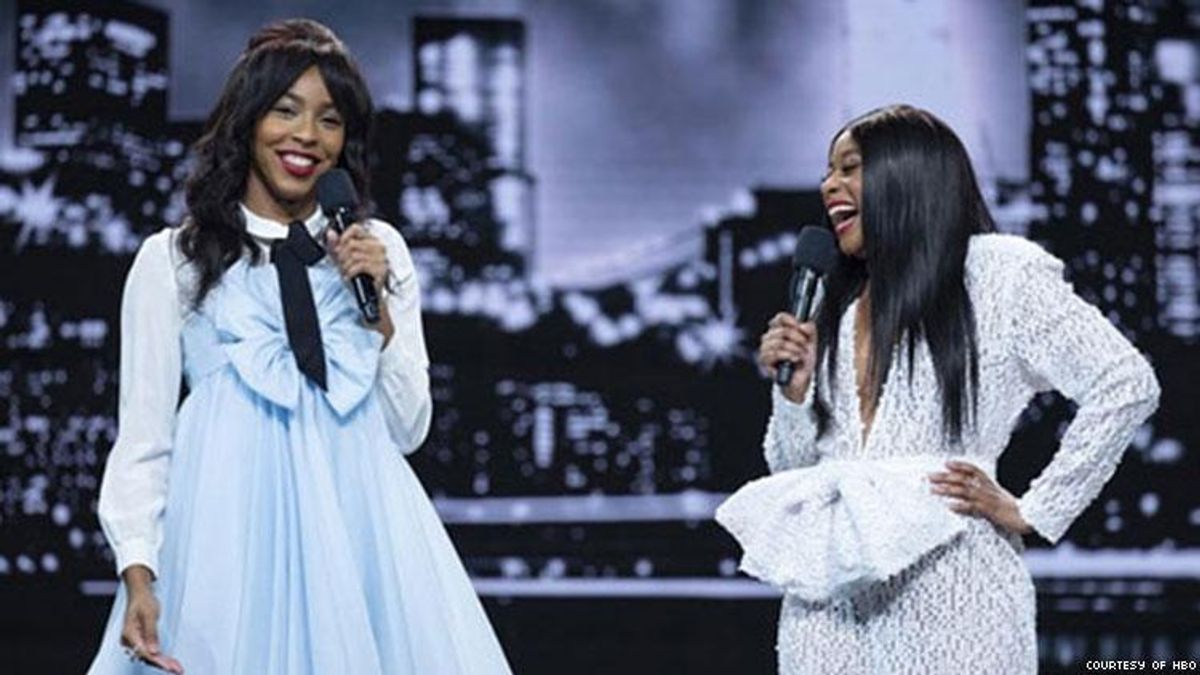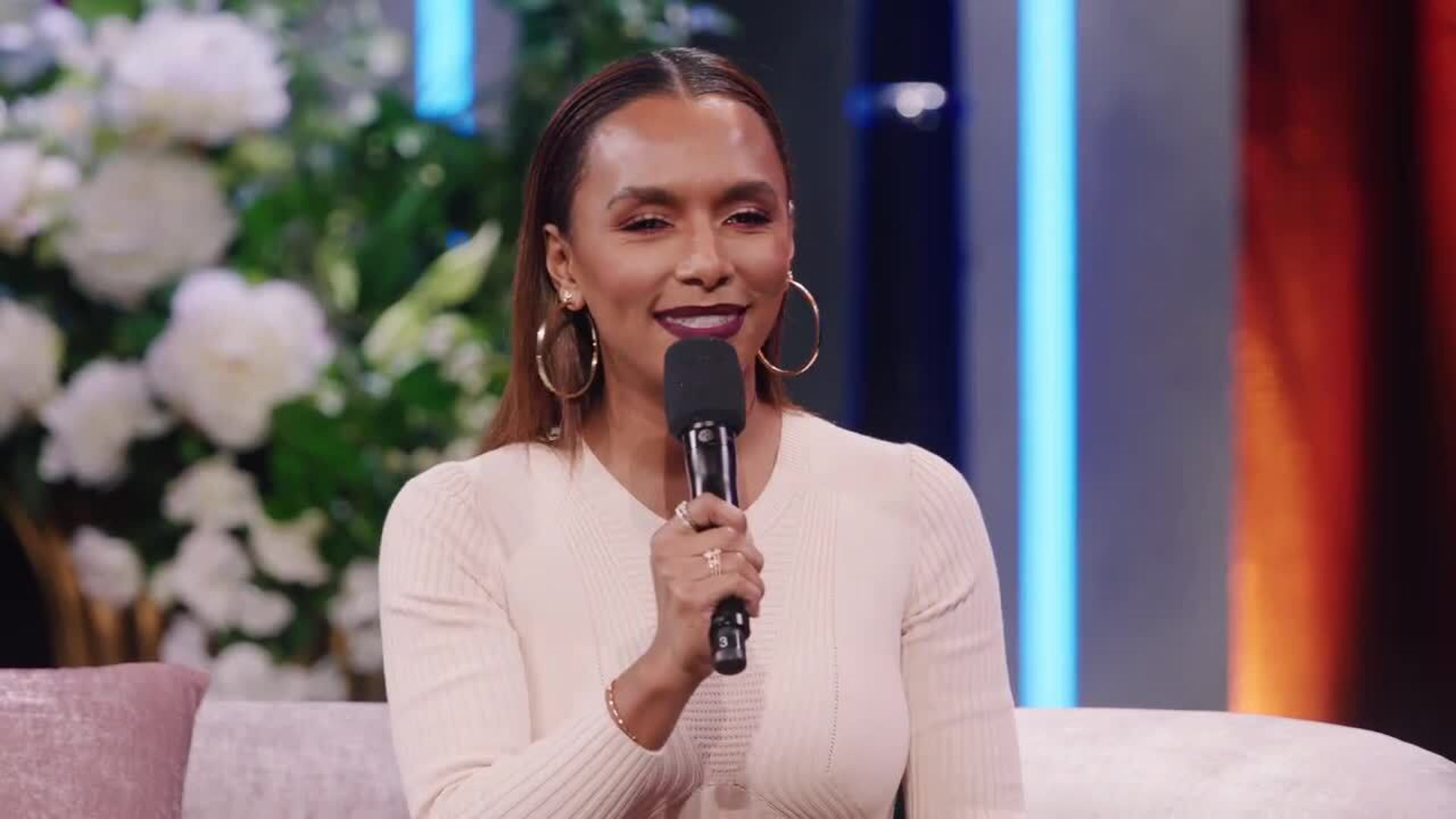Television
'2 Dope Queens’ Shows Us Comedy Can Be For Queer People Too

In the final season of their HBO special, Phoebe Robinson and Jessica Williams are bringing queer people to the front.
February 22 2019 11:26 AM EST
March 07 2019 12:54 AM EST
By continuing to use our site, you agree to our Private Policy and Terms of Use.

In the final season of their HBO special, Phoebe Robinson and Jessica Williams are bringing queer people to the front.
In seventh grade, I had a friend who was very much what you would call a "comedy enthusiast." He would, in a fit of desperate boredom, force us to sit and watch hours of comedy videos and stand-up specials on YouTube to pass the time.
Louis C.K., Bo Burnham, Daniel Tosh, Dane Cook -- each video felt like a foreign, uncomfortable language. Each comedian cracking one homophobic joke after another, peppered with misogyny and light racism in ways that closely resembled the very locker room talk that terrorized much of my high school years. In college, I would try to watch comedy at dive bars, or on Comedy Central, and still found much of the same thing. After a while, I started to tell people that I hated comedy. "Comedians are the worst kinds of people," I would often confidently declare in mixed company. Though this sweeping generalization was of course untrue, it was emotionally true to me at the time. Comedy, I had decided, just wasn't for me.
As a consequence of that, the first time I tried listening to 2 Dope Queens -- a live-taped podcast featuring a lineup of comedians each episode -- I didn't think it was for me. But the show would always open up with banter between its two hosts, Phoebe Robinson and Jessica Williams, which I found very entertaining and not-comedy-like, so I continued to subscribe just for them.
But after listening to a few episodes all the way through, I realized that the comedians featured by Robinson and Williams weren't anything like those I had grown up watching. These comics included women, were predominantly people of color, and were often gay or queer. Their humor would take jabs at white folks, toxic men, straight people, and openly discuss queer phenomena to the laughter and applause of their audience. It was apparent that 2 Dope Queens' curation of these comedians intentionally prioritized those on the margins. And that's when I realized: It's not that comedy wasn't for me. It's that the the majority of people getting platforms in comedy (cis, white, straight men) weren't for me.
"When I was coming up in comedy, I did so many shows with women, people of color, and queer people and I thought to myself -- I don't see any of them on TV," Robinson said in conversation with Samhita Mukhopadhyay at a press event with Williams for 2 Dope Queens. "I decided if we're going to do a show, it has to be something different. I wanted it to be about who we are and the people we hang out with."
"If you only hear one person's voice, you assume that's the standard by default. And a white guy doing stand-up is not the standard," Robinson tells Out, in regard to 2 Dope Queens' televised tapings of the podcast, now airing on HBO to coincide with the end of the podcast. "It's anyone who wants to get on stage, has a story to tell, and is funny as hell. We want to normalize it so that 30 years from now, if the planet is not completely on fire, comedy will have queer late night hosts instead of just the same white guys."
Robinson and Williams have, and always will, dedicate their show to the comedians who rarely get one. Comments on their iTunes page often note that they wish more time was spent with just the two queens themselves -- a complaint even I had when I first started listening. But their podcast is a testament of their dedication to giving away their platform so disenfranchised folks have time in the spotlight. Their HBO special is no different, featuring queer comedians like Bowen Yang, Solomon Georgio, Josh Sharp, Janine Brito, Pat Brown, and also conversations with guests like Janet Mock and Lizzo.
"Sometimes its 1000% more powerful to pass the mic to someone with that experience," says Robinson, "because there's gonna be someone out there watching 2 Dope Queens who sees Janine on stage and thinks, 'Oh, I can do comedy, because she's doing it.'" Both Robinson and Williams have stated that the male-dominated world of comedy was in large part the thing that inspired 2 Dope Queens in the first place, in 2015 pre-#MeToo. Robinson cites a recurring phenomenon where she would show up to a comedy set at a club, and people would ask her if she was a comedian's girlfriend, instead of the actual comedian on deck.
Figures like Louis C.K. or Azis Ansari, whose profiles have crumbled in the wake of an increasingly intersectional mediascape, prove just how ahead of their time Robinson and Williams were and still are. Putting women and queer folk at the forefront of a major cable television event isn't just inclusive -- it's a lesson in showing others how its done.
"Straight cis white men can be better by being allies when we're speaking, and learning how to help make a better space," says Williams. "They need to pull us up with them, look around at the women and queer people that have been around, and take us with them, and give us jobs to create our own shit."
Demonstrably so, Mock is the third episode's guest star, a queer icon Robinson and Williams have admired for a while. "To be such a trailblazer in so many arenas, a lot of people, trans or not, look to her like, 'If she can make this same path, there's no reason why I can't,'" says Robinson.

Like Mock, Robinson notes the importance of Black women and queer people being more than just featured guests, but as lateral collaborators, such as the case of Pose. "No woman is equal unless we're all equal," says Robinson.
"We can always improve, we can always expand our worldview. Trying to be a good ally, learning to close my mouth when I should, learning to speak up when I should, all these things I'm still trying to get a handle on, like most people." And that effort was the thing a 7th grade me was deprived of -- the willingness to give up one's platform when the time is right.
"Shouldn't everyone be on top of the mountain? If you can help, there's no reason not to."
2 Dope Queens is now streaming on HBO, released Fridays at 11pm ET/PT.
RELATED | Watch Queer Comedian Bowen Yang Slay '2 Dope Queens' Set